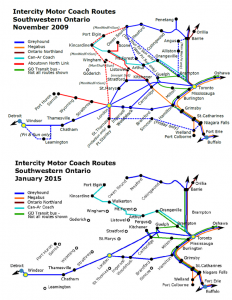
The Ontario Ministry of Transportation held well-attended public consultations on intercommunity bus services in London on August 23rd and Sarnia on August 24th. SWOTA and RAIL members joined a wide range of voices from across the region speaking up for decisive action to tackle the crisis caused by the loss of services to more than 100 communities since 2009.
Concern about proposed deregulation of inter-city bus services in Ontario was voiced by many, and better coordination of services was a consistent theme, including coordination between rail and bus. The Ontario government will receive a strong message from these meetings: protect services, restore services, integrate service, and provide green options for passenger travel all over the province.

Participants at both sessions were adamant that deregulation alone would not restore the services that so many of our communities have lost, and challenged the MTO policy team to produce evidence to support this assumption. Ontario has had a licensing system for intercommunity bus services since the 1920s, with operators requiring a license from the Ontario Highway Transport Board before entering the market, in contrast to the western provinces where the abolition of market exit controls led to the loss of hundreds of services.
SWOTA’s submission to the process emphasised the absolute necessity of restoring access to the public transportation network in order to ensure the long-term viability of smaller Ontario communities. To this end, we are calling for adequate investment by the province to support a core network of essential routes, as envisioned in our Network Southwest report. This submission was supported by the Western Ontario Wardens’ Caucus and Transport Action Ontario.
The challenges faced by Southwestern Ontario communities have a great deal in common with those faced in Eastern Ontario and Northwestern Ontario, where communities have also been stranded by the collapse of the intercommunity bus network.
Strong participation from a variety of interested parties was noted by all who attended the London meeting: an energetic mix of municipal, healthcare, social services, bus industry, and passenger advocacy groups. The lack of a central repository of route and schedule information to help passengers plan their trips was noted as a significant problem, while the integrated ticketing partnership between Robert Q Airbus and VIA Rail was cited as an example for new routes and operators to follow in order to provide convenient door-to-door journeys.